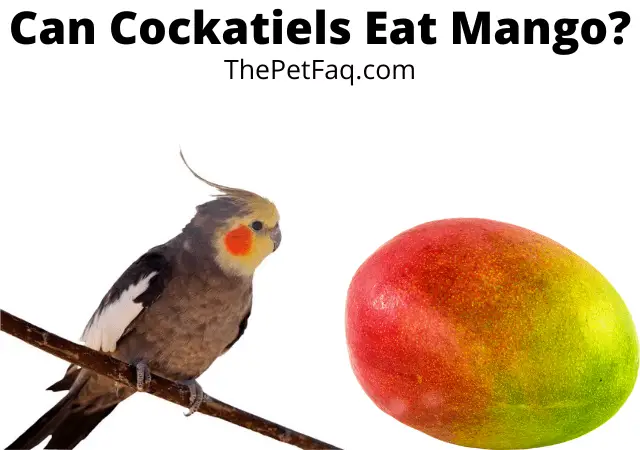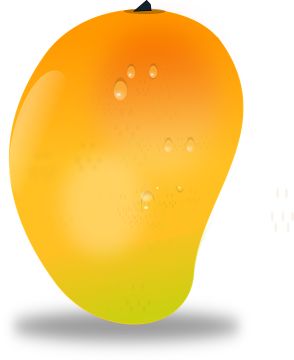People often wonder: can cockatiels eat mango? I think it’s great that you’re asking yourself questions like these. It shows you care and want the best for your bird. There are way too many people that just assume that a specific food is fine for their bird to eat without doing any research.
In today’s guide, I’m going to discuss everything you need to know about feeding this delicious fruit to your cockatiel. First, I will go over whether or not they can safely eat it. Then, we’ll discuss if there’s anything you need to be careful about. We’ll also discuss how to feed them this fruit and much more.

If you’re in need of a quick answer to the question of whether or not you can safely give mango to your cockatiel, here it is: Cockatiels can eat mango. The fruit is not harmful to them and they can in fact benefit from eating it because it’s quite rich in vitamins and minerals. Do make sure to give them a variety of different fruits, and not only mangoes. Also, make sure to remove the skin and not overfeed your bird.
I recommend reading through the whole article to get the most complete answer on how to feed mango to your cockatiel, including any necessary precautions you may need to take.
Can Cockatiels eat Mangoes and are they good for them?

Mangoes are a fruit native to South Asia. India is the biggest supplier of this fruit. Now, I’m not going to give a whole history of the mango. I assume that that’s not what you’re here for (if you are, check out the Wikipedia page instead).
What I will do though, is give a brief overview of the nutrients that can be found in these fruits. That way, we can get a better idea of what exactly we’re feeding our cockatiel. With that being said, let’s take a look at what nutrition data says is in 1 cup (around 165 grams) of this juicy fruit.
- 107 calories
- 28.1 grams of carbs
- 3 grams of fiber
- 24.4 grams of sugar
- 0.8 grams of protein
- 0.4 grams of fat
- 135 grams of water
Of course, we’re not going to feed our cockatiel a whole cup of mango, that’s way too much. After all, they’re small birds, weighing only around 70-120 grams, so a whole cup weighs more than they do!
Nevertheless, it’s useful to look at the nutrients this way because, in smaller quantities, the relative amount of nutrients stays the same. If we take a look at the nutrients above we can see that mangoes are quite low in calories and fat, while also containing a decent amount of fiber, which is great!
However, they also contain quite a lot of sugar. Cockatiels do not need a whole lot of sugar in their diet, so you should be careful not to overfeed your bird on this fruit.
Vitamins and minerals
So far, we’ve only talked about the macronutrients, but make no mistake, mangoes are very rich in several key vitamins and minerals.
In particular, they contain a good amount of Vitamin C, K, B6, and A while also having decent amounts of Potassium, Magnesium, and Calcium. These nutrients are usually not present in the normal food they eat (pellets and seeds), which is why making fruit part of their diet is such a good idea. They need these vitamins in their diet in order to thrive, and fruits like mangoes are a great way for them to get them.
They’re also a great source of antioxidants and electrolytes.
So, can cockatiels eat mango safely?

Yes, they can eat them safely. Nothing in the fruit is toxic to your bird, but there are a few things that you should watch out for.
First off, you should make sure that you remove the rind. The skin is edible, but it’s not very tasty and it’s not necessary for your bird to eat it. On top of that, the skin usually contains pesticides, which is not something you want your cockatiel to ingest. Pesticides are toxic and should be avoided.
Secondly, make sure that you do not overfeed your bird. Cockatiels have a very fast metabolism, but they’re still prone to obesity when you feed them too much. Make sure that you balance their diet well.
Lastly, do not feed them the stone (seed). Your bird will most likely not eat it if you leave it in because they instinctively know not to (they eat plenty of mangoes in the wild), but it’s better to be safe than sorry and remove it anyway.
How Much Mango Can Cockatiels Eat?
According to veterinarians such as Colin Walker, cockatiels need fruits and vegetables in their diet. As I’ve previously mentioned, it allows them access to certain nutrients that their pellets and seeds lack. It’s generally accepted that about 20 to 25% of their diet should consist of fresh fruits and veggies.
Nevertheless, while mangoes are a great fruit to include, you have to make sure that it’s not the only fruit they eat. It’s important to offer your cockatiel a variety of different fruits and vegetables. By doing so, you will ensure that they get access to many different kinds of vitamins and minerals.
On the whole, you can feed your cockatiel a small piece of mango every few days. It’s recommended to start slow and only offer them a little bit if they’ve never eaten it before. That way, you can keep an eye out to see if there are any problems. If there are problems, stop feeding it to them and try giving them some other fruits instead. If they eat it well, and there are no signs of runny stool or other problems, you can feed them a little bit more next time. However, as I’ve said, make sure not to go overboard and not to overfeed them on it. Keep the amount you feed them small.
How to feed mango to your cockatiel
Feeding this fruit to your cockatiel is quite easy, just follow these steps:
- Remove the skin.
- Slice it in half, remove the stone.
- Cut it into small pieces.
- Place a small piece in a separate bowl.
- Watch your mango to see if they enjoy it or not and to see if there are any problems.
Alternative fruits and veggies for your cockatiel

While most cockatiels will absolutely love mangoes, there’s a chance that your bird will not like it. And even if they do like it, they need a variety of many different kinds of fruits and veggies in order to have an optimal diet. To give you an idea of some fruits and veggies your bird can eat, I’ll give you a quick list:
Fruits
- Pineapple
- Watermelon
- Cucumber
- Berries such as blueberries, blackberries, raspberries, strawberries, or cranberries
- Apples (make sure to remove the seeds)
- Apricots
- Pears
- Oranges
- Bananas
Veggies
- Kale
- Zucchini
- Peas
- Bell Peppers
- Carrots
- Cauliflower
For a complete list of what your cockatiel can eat, I suggest you check out my cockatiel nutrition guide. It will teach you about the ideal diet for your bird, and will also go over all the fruits that are poisonous and thus can not eat, and the kids of fruits and vegetables they can safely eat. It also covers some good ideas for treats. For instance, did you know that they can have bread as an occasional treat?
The bottom line
So, now you know everything you need to know to safely feed mangoes to your cockatiel! Just to recap:
- Fruits and vegetables, such as mangoes, should be about 20-25% of your bird’s diet. Make sure to give them a variety of different kinds of fresh produce so that they get many different vitamins and minerals.
- Fruits and vegetables are an addition to their diet, not a replacement. Do not replace their regular pellet diet with fruits in any circumstance.
- Make sure to remove the skin and the stone.
- Do not overfeed your cockatiel.
On the whole, if you take the advice above into account, mangoes are a great fruit to include in your cockatiel’s diet. They’re safe, and most cockatiels absolutely love eating them. I highly recommend giving it a try!
- How Long Do American Eskimo Dogs Live? Important Factors and Care Tips - September 29, 2023
- Do American Bulldogs Need Grooming? Essential Tips and Care Guidelines - September 29, 2023
- Do Bengal Cats Enjoy Playing? Essential Tips for Keeping Them Active - September 29, 2023